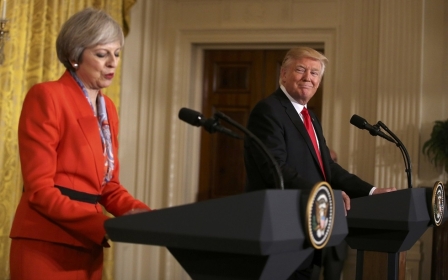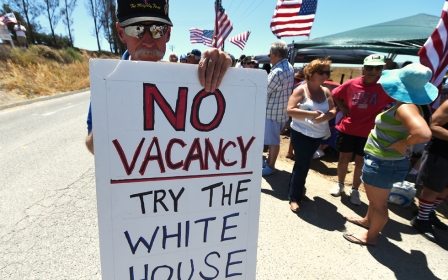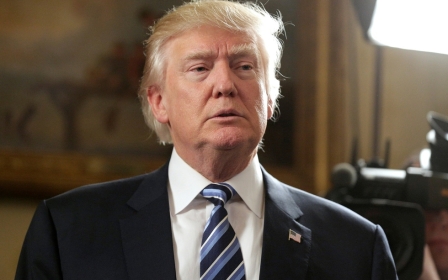Muslim ban: Trump suspends immigration from several Muslim-majority countries
US President Donald Trump on Friday signed an executive order that effectively bans immigrants from several Middle Eastern countries from entering the United States and temporarily suspends the country's refugee admissions programme. Trump's order coincides with Holocaust Remembrance Day.
"I'm establishing new vetting measures to keep radical Islamic terrorists out of the United States of America," Trump said. "We only want to admit those into our country who will support our country and love deeply our people."
At a ceremony at the Pentagon to swear in James Mattis as his secretary of defense, Trump signed a decree entitled: "Protection of the nation from foreign terrorist entry into the United States."
"Big stuff," he declared, to polite applause from gathered senior military brass.
The order suspends refugee resettlement for 120 days. It specifically proclaims Syrian refugees "detrimental to the interests of the United States," halting their admission indefinitely.
In addition, Trump ordered the suspension of visas and immigration benefits to countries of "particular concern" for 90 days. The text of the order does not identify those countries, but media reports citing US officials said they include Iran, Iraq, Syria, Yemen, Sudan, Libya and Somalia.
"The United States must be vigilant during the visa-issuance process to ensure that those approved for admission do not intend to harm Americans and that they have no ties to terrorism," the order reads.
But beyond "terrorism" the order reflects Trump’s rhetoric about ideological testing for would-be immigrants.
The new act says the US should not "admit those who engage in acts of bigotry or hatred (including 'honor' killings, other forms of violence against women, or the persecution of those who practice religions different from their own) or those who would oppress Americans of any race, gender or sexual orientation."
"They're ISIS. They're coming under false pretense. I don't want that," Trump said of refugees in an interview with ABC on Wednesday.
Prioritising Christians
On Friday he told the Christian Broadcasting Network that he would give priority to persecuted Christian seeking refuge in the US.
"We are going to help them," Trump said of Christians. "They’ve been horribly treated."
Trump claimed that it was "impossible, at least very tough" for Syrian Christians to be accepted into the US.
But according to Pew Research Center, the US admitted almost equal numbers of Christian and Muslim refugees in fiscal year 2016.
Stephen Legomsky, a former chief counsel at US Citizenship and Immigration Services in the Obama administration, said prioritizing Christians may be unconstitutional.
"If they are thinking about an exception for Christians, in almost any other legal context discriminating in favour of one religion and against another religion could violate the constitution," he said.
But Peter Spiro, a professor at Temple University Beasley School of Law, said Trump's move may be constitutional because the president and Congress are allowed considerable deference when it comes to asylum decisions.
"It's a completely plausible prioritization, to the extent this group is actually being persecuted," Spiro said.
Social media users rejected the preferential treatment for Christian refugees that Trump promised.
The hashtags #MuslimBan and #NoBanNoWall had been trending on Twitter and Facebook.
Michael Hanna, a fellow at the Century Foundation think-tank tweeted that as an Egyptian-American and a Copt he finds the policy of favouring Christian refugees "both morally appalling and counterproductive in practice".
'Heartless act'
Civil rights and Muslim groups were quick to denounce Trump’s executive order.
"If you come to my hometown of Dearborn, you will see that Arab Americans and refugees are part of the fabric of our community ... they are among the most loyal and patriotic Americans I know."
-Debbie Dingell, member of US Congress
American Civil Liberties Union executive director Anthony D Romero said "extreme vetting" is euphemism for discrimination against Muslims.
"Identifying specific countries with Muslim majorities and carving out exceptions for minority religions flies in the face of the constitutional principle that bans the government from either favoring or discriminating against particular religions," he said in a statement. "Any effort to discriminate against Muslims and favor other religions runs afoul of the First Amendment."
Muslim advocacy group MPower Change called the order a ban that "stems from deep-seated, almost maniacal anti-Muslim hate that captured Trump and his cabinet".
James Zogby, president of the Washington-based Arab American Institute, said the ban is a misguided act.
"With one broad stoke, he has slammed the door on tens of thousands of innocents fleeing persecution and seeking refuge in our country," Zogby said in a statement, addressing the possible suspension of refugee resettlement.
"This heartless act is not based on security concerns, since those applying for refugee status already go through a rigorous vetting process. Rather, it is based on fear and prejudice and is a stain on our nation's honour."
US Congresswoman Debbie Dingell, a Democrat whose district in southeast Michigan is home to large Arab and Muslim communities, denounced the order, calling it deeply disturbing.
She said Trump's action violates fundamental American principles, including compassion and freedom of religion.
"If you come to my hometown of Dearborn, you will see that Arab Americans and refugees are part of the fabric of our community – they are our doctors, teachers, small business owners and servicemembers, and they are among the most loyal and patriotic Americans I know," Dingell said in a statement.
New MEE newsletter: Jerusalem Dispatch
Sign up to get the latest insights and analysis on Israel-Palestine, alongside Turkey Unpacked and other MEE newsletters
Middle East Eye delivers independent and unrivalled coverage and analysis of the Middle East, North Africa and beyond. To learn more about republishing this content and the associated fees, please fill out this form. More about MEE can be found here.




